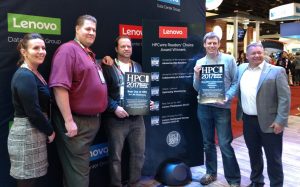We’re here to help support researchers at Birmingham and we’re really proud to have been supporting the CLIMB project over the past few years. This year, the MRC-funded Cloud Infrastructure for Microbial Bioinformatics (CLIMB) has been recognised in the annual international HPCWire Readers’ and Editors’ Choice Awards, announced at the SuperComputing 2017 conference in Denver. The awards they received were:
- “Best Use of HPC in Life Sciences” for Real-Time analysis of Zika genomes, supported by Lenovo, OpenStack, IBM, Red Hat and Dell EMC.
- “Best HPC Collaboration (Academia/Government/Industry)” for CLIMB drawing on Lenovo, OpenStack, IBM Spectrum Scale, Red Hat, and DELL EMC to provide resources for projects that globally impact public health.
For those not familiar with the CLIMB project, its a large OpenStack system distributed over four University sites and supporting over 200 research groups across the UK. Funded by the MRC in 2015 its intended to support microbial bioinformaticians and can provide access to VMs with up to 3TB of RAM and 196 cores.
The pilot work for the CLIMB project was developed at Birmingham, with the research computing team assisting the research group in design and procurement of the hardware. Once the pilot work was complete, the design was then taken and rolled out at the other 3 sites running CLIMB hardware. As we developed the solution we were lucky to be able to get the skills of Radoslaw Poplawski, who joined Research Computing at Birmingham and has taken the initial development work on CLIMB to move it to full service.
We’re really pleased that the work CLIMB has been doing has been recognised by these HPCWire awards, from the systems side particularly the Best Collaboration awards – we do work both closely with our researchers and also our technology partners to help deliver solutions.
The work for Best HPC Application in Life Sciences was led at Birmingham by Professor Nick Loman, you can find out more about Nick’s research group and the ZIBRA project.
Having built the CLIMB project pilot services here at Birmingham, we then built on this to deliver BEAR Cloud, the private research cloud available to University researchers. We learned a lot building CLIMB, some good, some bad, and as part of the development of BEAR Cloud, we worked closely with our hardware partners, in particular Lenovo and Mellanox, to deliver technology better suited to our cloud platform needs.

Simon Thompson from the Research Computing Team received the awards on behalf of the CLIMB project at SuperComputing 2017 (#SC17) in Denver, pictured here with Kate Steele, Jim Roche, (both Lenovo UK), Matthew Ziegler (Director HPC Architecture and Strategy, Lenovo Data Center Group), Simon Thompson (Research Computing, University of Birmingham) and Scott Tease (Executive Directory HPC and AI, Lenovo Data Center Group).
You can find out more about some of the exciting research being done with BEAR in the BEAR Case Studies.
And finally, if you are interested in hearing more from Lenovo on the work we do with them, check out Scott’s #SC17 HPCWire video round-up:
